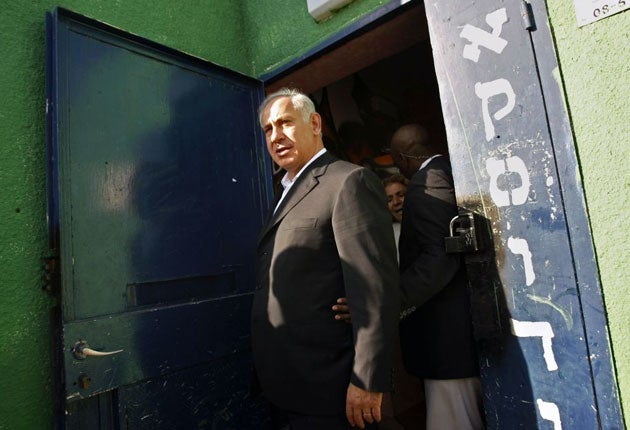Netanyahu casts himself as player on a world stage
Right-winger calls for destruction of Hamas in defence of democracy

At any other time there would be nothing notable about Benjamin Netanyahu reminding everyone that he thinks that "at the end of the day" there is "no alternative" but to "bring down" Hamas. But at a time when the ostensible aims of the war Israel has waged for 18 days have fallen rather short of that, it can hardly fail to have an impact. The leader of the right-wing opposition party Likud, and the man the polls predict could become prime minister in less than a month's time chose to do it, moreover, during a fluent session with foreign journalists in which – for much of the time at least – he cast himself as a statesman comfortable on the global stage and determined to remain above party politics at a time of war.
He said he was looking forward, if elected, to working with Senator Hillary Clinton as US Secretary of State, without the slightest hint of the friction that existed between him and her husband, President Bill Clinton, when the Likud leader was prime minister in the Nineties.
Justifying a vote by a Knesset committee this week to ban two Arab parties from contesting the elections, he smoothly quoted a remark by the rationalist philosopher Baruch Spinoza that "democracy allows all the freedoms except the freedom to destroy democracy". And even at his most bellicose, he eschewed the rhetoric his main rival, Tzipi Livni, has unashamedly used about Israel "going wild". Instead he declared at one point of the many hundreds of Palestinian casualties: "We grieve for every one of them; we genuinely do," before adding, inevitably: "But a responsible government does not give immunity to criminal terrorists who fire at us while using civilians as a human shield."
But this is not the whole story. Mr Netanyahu was aiming yesterday at an overseas audience. Indeed he spoke explicitly about the need to start "rolling back" the attacks from abroad on Israel's conduct of the war – attacks which he said have a "dual feature". One is "that they distort the truth and the second is that they distort morality. It is not true that Israel is targeting civilians. It does everything in its power to minimise civilian casualties but these are inevitable in a war in which the terrorists embed themselves in the civilian population... what would you do if your country was rocketed for a full eight years with thousands of rockets?"
He knows that he does not have to convince the large majority of Israelis still undeterred from their support for the war by a Palestinian death toll in Gaza which could, after only two and a half weeks, overtake the one incurred in Lebanon in five weeks in 2006, and included by Monday night 292 boys and girls under 18, and 75 women. And fully accepting of the military's explanation reported in the Israeli press that it has put its own soldiers' safety first and that of Palestinian civilians second. For an Israeli audience, Mr Netanyahu's task is to retain his appeal to just that supportive majority when – unlike two of his political rivals, Ms Livni and Ehud Barak, the Defence Minister – he is not actually running the war most of them so approve of.
But the long shadow of his own popularity, as the leading politician who has most consistently advocated the removal of Hamas, certainly hangs over this bloody campaign. For now he is choosing his words carefully, saying that Israel must achieve over Hamas "a victory which will cripple its capability to perpetrate terrorist attacks against us and restore deterrence throughout the region. It must stop the smuggling corridors that enable Hamas to smuggle thousands of rockets into Gaza... The government has had and will continue to have my support to achieve this objective. I also said that Hamas, a terror organisation that is committed to our destruction, must ultimately be removed from Gaza. Should the government decide to seek that objective, it will also have our support."
Which leaves, as Ms Livni, Mr Barak and Ehud Olmert, the outgoing Prime Minister, know only too well, plenty of room in the interval – assuming there is one – between the end of the war and the election to criticise the basis on which it ends if it fails to meet his requirements, and to take some of the credit if it does. Towards the end of his news conference yesterday, he was asked if he thought the government might not have embarked on the operation if he hadn't been advocating it from an electorally threatening position. "I haven't any idea," he said crisply. It was a reply that strictly adhered to the ban on electioneering imposed during Operation Cast Lead. But it was hardly a denial.
Subscribe to Independent Premium to bookmark this article
Want to bookmark your favourite articles and stories to read or reference later? Start your Independent Premium subscription today.

Join our commenting forum
Join thought-provoking conversations, follow other Independent readers and see their replies